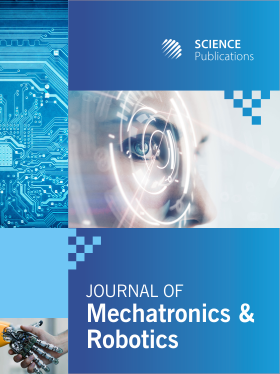Geometry and Inverse Kinematic at the MP3R Mobile Systems
- 1 Bucharest Polytechnic University, Romania
- 2 Second University of Naples, Italy
- 3 Florida Institute of Technology, United States
- 4 North Carolina A and T State University, United States
Abstract
The development and diversification of machines and mechanisms with applications in all fields require new scientific researches for the systematization and improvement of existing mechanical systems by creating new mechanisms adapted to modern requirements, which involve increasingly complex topological structures. The modern industry, the practice of designing and building machinery is increasingly based on the results of scientific and applied research. Each industrial achievement has backed theoretical and experimental computer-assisted research, which solves increasingly complex problems with advanced computing programs using an increasingly specialized software. The robotization of technological processes determines and influences the emergence of new industries, applications under special environmental conditions, the approach of new types of technological operations, manipulation of objects in the alien space, teleoperators in the top disciplines like medicine, robots covering a whole field greater service provision in our modern, computerized society. Movable, robotic, mechatronic mechanical systems have entered nearly all industrial spheres. Today, we can no longer conceive of industrial production without these extremely useful systems. They are still said to steal from people's jobs. Even so, it should be made clear that these systems create value, work in difficult, repetitive, non-pausing, high-quality work, without getting tired, without getting sick, without salary, and producing value who are paid and people left without jobs, so that they can work elsewhere in more pleasant, more advantageous conditions, with the necessary breaks. In other words, robots do not destroy people but help them in the process of work. Let us not remember the fact that in some environments people could not even work. In fact, the robot's profitability for work without stopping, repetitive, and qualitative, is no longer in question. In addition, there are many heavy operations that are absolutely necessary for the presence of robots. You can not create microchips with people directly without interposing the robot. Man can not directly work with objects of such small size. Neither difficult medical operations can be designed without robotic mechatronic systems. The most used robotic mechanical mechanical systems are the anthropomorphic ones in the class of serial systems. To this we have studied the direct kinematics in previous castings, and in this paper we are going to study the inverse kinematics.
DOI: https://doi.org/10.3844/jmrsp.2017.58.65

- 5,126 Views
- 2,641 Downloads
- 3 Citations
Download
Keywords
- Mechanism
- Robots
- Mechatronics
- Mechanical Systems
